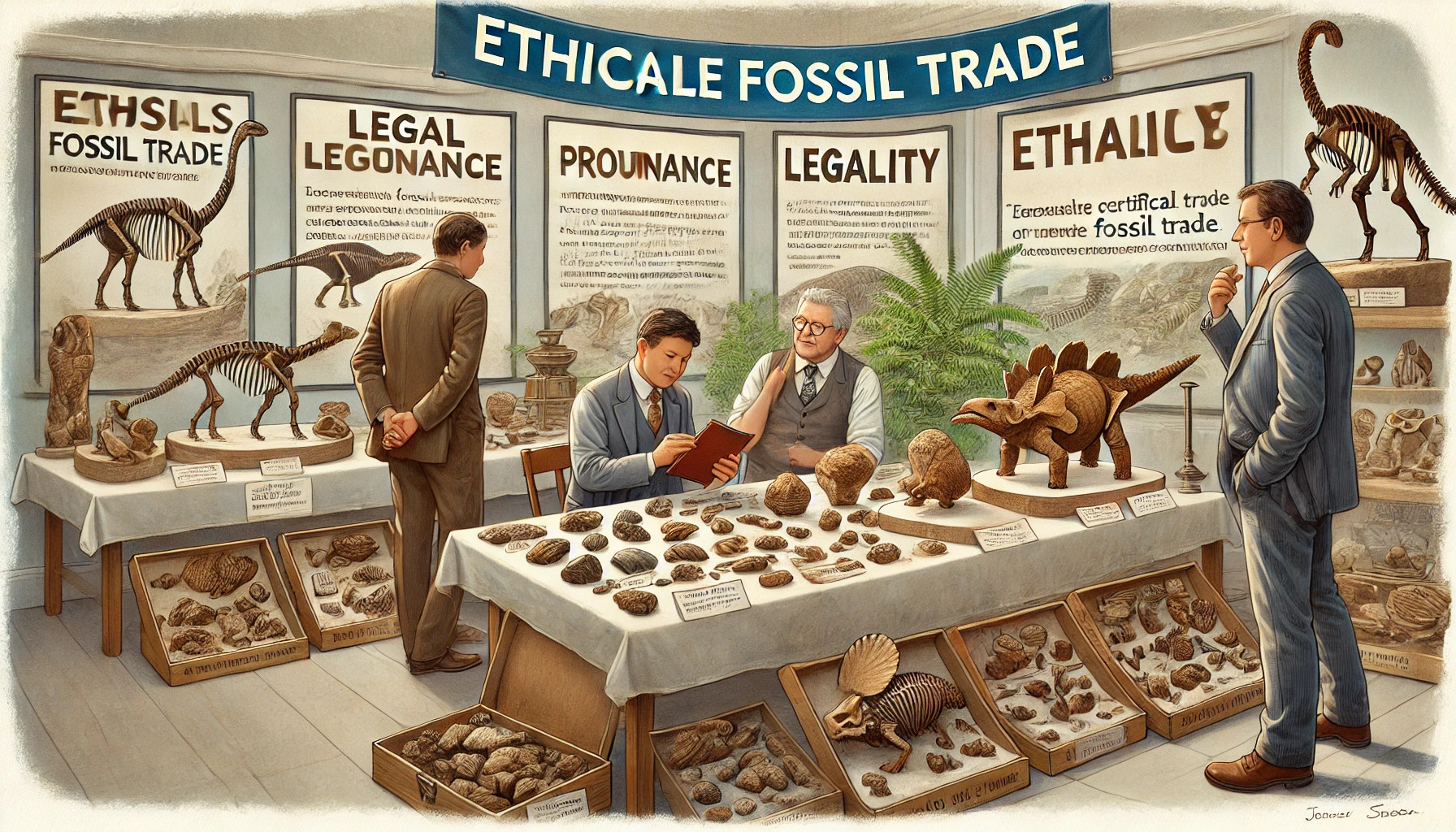The world of fossils can be both fascinating and complex. When considering the ethics of selling fossils, it’s crucial to understand the responsibilities that come with sourcing and selling these ancient treasures. Many fossils are often removed from their original context, which can lead to a loss of valuable scientific information.
Understanding the legal and ethical implications is essential for anyone involved in the fossil trade. There are reputable dealers who prioritize responsible practices, ensuring that fossils are ethically acquired and accessible for scientific study. They play a vital role in balancing commercial interests with the preservation of paleontological knowledge.
Anyone looking to sell or buy fossils should also be aware that the value of a fossil goes beyond monetary worth; it includes its scientific significance. Making informed choices helps protect the integrity of paleontology and contributes positively to the community.
Historical Context of Fossil Trading
The practice of fossil trading has a rich and complex history. Understanding how this trade evolved helps clarify its current ethical considerations. The following sections explore the key developments and influences in fossil trading from its early days to modern practices.
Pre-20th Century Fossil Discoveries
Fossil discoveries began in earnest during the early 19th century. Scientists like Mary Anning pioneered the field of paleontology while collecting and selling fossils. Anning’s work along the Jurassic coast of England unlocked significant insights into prehistoric life.
Her fossil sales not only supported her family but also fueled scientific interest. Fossils, once seen as mere curiosities, began to be recognized for their scientific value. This marked the beginning of a formal fossil trade where both collectors and scientists sought unique specimens.
Growth of Commercial Fossil Trade
By the mid-20th century, fossil trading expanded significantly. The rise of interest in natural history and paleontology led to increased demand for fossils. This demand created a market that included amateur collectors and professional traders.
Countries around the world became hotspots for fossil hunting. Notably, regions in the United States and China began to attract both local and international collectors. As fossil prices rose, so did concerns about the legality and ethics of fossil collection.
High-Profile Auctions and Their Impact
High-profile fossil auctions have grabbed public attention and driven up market prices. Famous sales, like the auction of a T-Rex skeleton, highlighted the intersection of science and commerce. These events not only showcased rare fossils but also emphasized their value as luxury items.
This trend led to debates among academics and collectors about the fate of fossils. Many researchers worry that private ownership obscures scientific study. The growing market has prompted calls for stricter regulations to protect fossils and ensure ethical collecting practices.
With each auction, the tension between commercial interests and scientific integrity becomes increasingly evident.
Legal Framework Governing Fossil Sales
The sale of fossils is influenced by a mix of international laws, country-specific regulations, and ownership issues. Understanding these legal aspects is important for anyone involved in buying or selling fossils.
International Laws and Treaties
Several international agreements impact fossil trading. The UNESCO Convention on the Means of Prohibiting and Preventing the Illicit Import, Export, and Transfer of Ownership of Cultural Property aims to protect significant fossils from illegal trade.
Another key agreement is the Convention on International Trade in Endangered Species of Wild Fauna and Flora (CITES), which regulates the trade of endangered species. While fossils are not always classified as endangered, this framework affects certain species. Individuals must check if their fossils are covered by these laws before selling.
Country-Specific Regulations
Different countries have specific laws dictating how fossils can be collected and sold. For instance, in the United States, laws differ by state. Some states require permits for fossil collection, while others have no restrictions.
In China, individual fossil hunting is banned, but the sale of certain “ordinary” fossils is allowed under strict regulations. This creates a complex landscape for fossil sellers. It is crucial for sellers to familiarize themselves with local laws to avoid legal issues.
Ownership and Land Rights Issues
Ownership of fossils can be contentious. Fossils found on private land usually belong to the landowner. This means that if someone collects a fossil without permission, they may face legal consequences.
Public lands often have stricter rules regarding fossil collection. In many cases, fossils discovered on public land belong to the government. As a result, individuals must obtain permits before collecting fossils in these areas. Being aware of land rights can prevent misunderstandings and potential legal troubles.
Ethical Considerations in Fossil Commerce
When dealing with fossil commerce, several ethical points come into play. Understanding the tension between scientific discoveries and commercial interests is vital. Alongside that, the potential for illegal trade raises concerns. Lastly, the impact on paleontology research cannot be overlooked.
Scientific Value vs. Commercial Interests
Fossils hold immense scientific value, providing insights into ancient life, evolution, and past ecosystems. When fossils are sold for profit, their scientific context can be lost. Many collectors prioritize aesthetics and rarity over the fossils’ importance to science.
Loss of Context:
When a fossil is removed from its original site without proper documentation, valuable information may vanish. This documentation is crucial for future scientific study.
The balance between commercial interests and preserving scientific integrity is a delicate one. Responsible collectors often work with scientists to ensure fossils contribute to knowledge rather than just decoration.
Potential for Illicit Trade
The fossil trade has a dark side due to the potential for illegal actions. Some fossils are collected without permission, often from protected sites. This illegal collection harms the environment and our understanding of history.
Risk Factors:
- Looting: Areas of paleontological significance can become targets for looters.
- Fake Fossils: The market for fake fossils is also a concern. Unscrupulous sellers might deceive buyers, undermining the trust within the community.
Legal frameworks exist to guide collectors, but not everyone follows them. Awareness and adherence to laws are key in preventing illicit trade.
Impact on Paleontology Research
The way fossils are sold can significantly affect paleontology research. When fossils are locked away in private collections, access becomes limited for scientists. This restricted access can slow down research efforts and stifle new discoveries.
Consequences for Science:
- Limited Access: Researchers may struggle to study certain specimens if they are in private hands.
- Funding Issues: Commercial collectors often prioritize profit over scientific inquiry.
Collaboration between collectors and researchers can help ensure fossils enrich scientific understanding. Shared knowledge benefits everyone and keeps the passion for paleontology alive.
The Debate Around Private Collections
The discussion about private ownership of fossils includes various points of view. Some see benefits in private collections, while others worry about the potential loss to scientific research.
Benefits to Private Ownership
One argument for private fossil collections is that they can inspire interest in paleontology. When collectors display their fossils, it may attract attention from the public and even encourage new enthusiasts to explore the field.
Private collectors often invest significant resources into their collections. This investment can lead to better preservation methods and access to advanced research techniques. Moreover, some collectors contribute to scientific knowledge by sharing their finds with researchers. This sharing can enhance the understanding of paleontology and help fill in gaps in the fossil record.
Risk of Loss to the Scientific Community
On the flip side, private collections can pose a risk to scientific research. When fossils are sold to private owners, they may become inaccessible to the public and researchers. This limits scientific study and the ability to educate others about important discoveries.
Another concern is that many private collectors prioritize profit over scientific value. Fossils may be sold at high prices, making it difficult for museums and institutions to acquire them. This situation can lead to a decline in shared knowledge, as the fossil record effectively gets locked away in private homes. Ultimately, this trend can have negative consequences for paleontology as a whole.
Conservation and Protection Efforts
Conservation and protection of fossils are vital for maintaining the Earth’s geological history. This includes the roles played by various institutions, educational initiatives, and efforts to recover and repatriate fossils. Here is a closer look at these crucial aspects.
Role of Museums and Institutions
Museums and research institutions play a key role in fossil conservation. They often serve as custodians of significant fossil finds, ensuring proper storage and care.
These organizations also conduct research to enhance knowledge about fossils and their environments. Methods such as temperature regulation and humidity control help preserve delicate specimens.
Additionally, museums engage in outreach programs to share knowledge and promote the importance of fossils in education. By hosting exhibitions and workshops, they encourage respect for paleontological heritage.
Education and Public Awareness
Education is essential in promoting fossil conservation. Schools, museums, and community programs help raise awareness about the significance of fossils.
Public awareness campaigns often include workshops, lectures, and interactive exhibits. These efforts encourage responsible behavior towards fossil collection and promote an understanding of legal frameworks governing fossil trade.
Programs aimed at children help instill a sense of responsibility for the environment. Engaging young minds ensures that future generations value and protect our planet’s fossil treasures.
Recovery and Repatriation of Fossils
The recovery and repatriation of fossils are critical for ethical fossil management. Many countries have laws protecting their paleontological heritage.
When fossils are discovered, it is essential to assess their origin and significance. This process helps ensure that fossils are returned to their rightful locations.
Collaboration between governments and institutions often leads to successful repatriations. This not only restores valuable specimens to their places of origin but also honors cultural and historical contexts.
Best Practices for Ethical Fossil Trade
Engaging in the fossil trade ethically requires careful attention to several key areas. By focusing on verification of provenance, ensuring legal compliance, and fostering transparency in sales, sellers can responsibly contribute to the paleontological community.
Verification of Provenance
Provenance refers to the history of ownership of a fossil. Sellers must verify the source of each specimen. This includes understanding where it was found and who collected it.
Many reputable dealers provide documentation that outlines this history. Buyers should always ask for this proof. This practice helps to ensure that fossils were collected legally and ethically, minimizing potential harm to important geological sites.
Documentation should ideally include photographs of the fossil in situ, details of the excavation, and any permits required for collection. Clear provenance not only protects the environment but also guards against the sale of stolen or illicitly obtained fossils.
Ensuring Legal Compliance
Legal compliance is crucial in the fossil trade. Sellers must familiarize themselves with local and international laws regarding fossil collection and sale. Regulations can vary widely between countries and even states.
Some regions may have strict laws protecting fossil sites. Violating these laws can result in severe penalties, including fines and imprisonment. Sellers should obtain any necessary permits before collecting or selling fossils.
Additionally, it’s smart to stay informed about changes in laws and regulations. This commitment to legality protects the integrity of the fossil market and supports the ongoing scientific study of fossils.
Fostering Transparency in Sales
Transparency is key in building trust between buyers and sellers. Ethical sellers should openly disclose details about each fossil, including its origin, condition, and any restoration work done.
Providing clear, accessible information helps buyers make informed decisions. It also fosters a sense of accountability within the fossil trade community.
Sellers can encourage transparency by using online platforms that require detailed listings. They might also participate in professional organizations that promote ethical standards within the industry. This level of openness benefits everyone involved, helping to cultivate a responsible trading environment.

